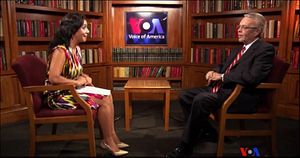In a recent interview with VOA Uzbek Service’s Navbahor Imamova, outgoing Principal Deputy Assistant Secretary of State for South and Central Asian Affairs, Ambassador Richard E. Hoagland, commented on regional worries about ISIS and the importance of people to people connections. Hoagland, while offering nuanced comments on diplomacy, seemed to dodge away from answering what worries him most about the region’s future.
The threat of ISIS – or more specifically, Central Asians joining the extremist group in Syria and then returning to Central Asia – is a concern cited by Central Asian governments. While Moscow has highlighted the threat of both ISIS and Taliban spillover from Afghanistan, Washington has downplayed the threat, though not dismissing it entirely. “Now we would judge that while we must be vigilant, while we need to pay close attention, this [ISIS] is not yet a major serious threat to the security and governments and peoples of Central Asia.”
Hoagland said, “We need to pay attention to international security, but I want to emphasize, it’s not like the barbarians are at the doorstep ready to sweep into all of Central Asia.”
But if ISIS is not the region’s main threat, Hoagland seemed dodgy with offering an alternate for the role. Imamova, in the second half of the interview, asked a fairly straightforward (though, admittedly, difficult to answer) question: “Looking forward to the future, what worries you most as someone, again, who knows the region?”
Hoagland answered a different question, saying he didn’t have plans for what he’ll do now that he’s retiring. Imamova reformulated her question, asking what his colleagues should be looking at in the region, what major issues–beyond the usual problems–other American diplomats should be focusing on.
Hoagland, again, didn’t quite answer but he did offer a defense of diplomacy in general, noting that “one of the most important things we can achieve is mutually respectful relations with our partners, mutual understanding with our partners, and you know what? That’s not always possible because governments can be difficult.” He points out that from his perspective, as an Ambassador, both foreign governments and the U.S. government can be difficult.
The most important thing is to establish the people-to-people relationships because all over the world, people are much the same. They want a good life. They want a better life for their children. They want a successful life. As we establish people-to-people relationships, we understand each other better, and that then can cushion some of the more difficult periods in high-level diplomatic life.
The recent spat between the U.S. and Kyrgyzstan certainly qualifies as one of those “more difficult periods in high-level diplomatic life.” But Hoagland seemed hopeful, noting that the U.S. needs to be “strategically patient” and recall the ups and downs of the past 20 years:
Are we in a little bit of a difficult period right now? Yes. No one can deny that, but we have had a long relationship, and I firmly believe that as time goes by, we will find ways to make that a mutually respectful and mutually positive relationship again. I have no doubt.

































